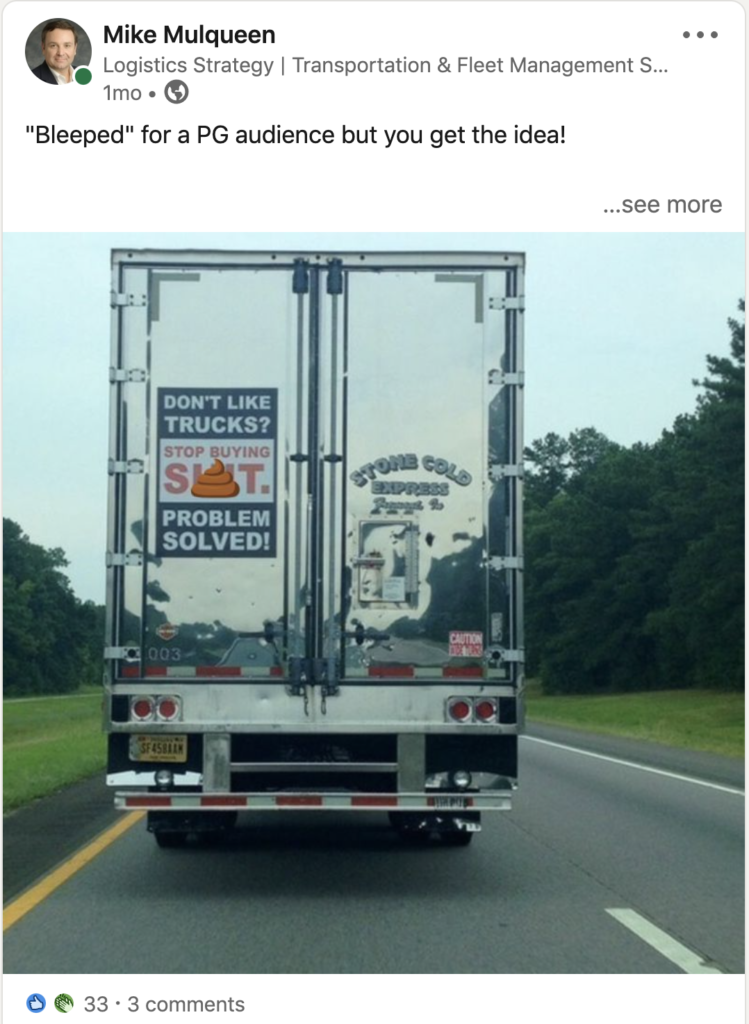Two related events happened recently.
First, a colleague, Mike Mulqueen, posted this fun photo on LinkedIn.
This reminded me how many times I have seen friends or family complain about “all the trucks on the road” and politely ask them if they would like to see these vehicles off the road?
“Yes, that would be great!”.
Okay, then you plan on quitting on-line shopping, making your own clothes, and starting a farm in your off-hours from work, right?
“No, that’s nuts. Why would I do any of that?”
Trucks Move the American Economy
Well, trucks are responsible for moving over 70% of total freight in the U.S. and 80% of US communities depend on trucks for delivery of everyday goods, spanning raw materials, food, medicine, and much more, per the Bureau of Transportation Statistics.
Just about every sector of the American economy relies on trucking, and if the trucking industry ceased, many of our lives would be affected.
- Behind the scenes, industries like mining, construction, utilities, infrastructure, and heavy industry would collapse without the delivery of necessary commodities.
- Electricity would turn off in your home.
- Hospitals would run out of supplies.
- The shelves in your local grocery would be empty.
- Gas stations would run out of fuel.
- Frankly, trucks touch nearly every part of your life every day.
- And OEMs are constantly improving fuel economy and safety.
“Just about every sector of the American economy relies on trucking, and if the trucking industry ceased, many of our lives would be affected.”
Secondly, an acquaintance asked me about my profession.
After the basics, he mumbled something about trucks, planes, trains and boats ruining the climate. My reaction, not unlike above, was the practical one. We need those vehicles, nearly everything has seen the inside of a truck or other vehicle.
Later that day I started thinking more about the “Green” or sustainability side of the supply chain. Admittedly, we as a profession can do better (JBF will be publishing some POVs soon). But at its core the supply chain and the professionals involved are inherently green.
We are constantly looking for ways to improve operations (or reducing waste) in order to reduce miles, improve capacity utilization, lower inventory levels, save on dunnage and packaging, and so forth.
Recently I came across a quote that encompasses this thinking - “the greenest mile is the mile not traveled.”
The foundation for many improvement opportunities is better planning and execution enabled by use of technology.
Take Action
Here’s some actions you can take as a shipper or a carrier:
- Become an expert in your organization as to what the industry considers leading thought
- Know what you your peers are thinking about and doing in this space - don’t get left at the starting line
- Know your existing data and operations - where are there opportunities for real change?
- Still unsure? Ask a supply chain professional like JBF Consulting for their POV. They live this stuff everyday
“The greenest miles are those not driven”
A holistic view saves money, reduces waste, and is the foundation upon which we must start, but it is not enough.
With the supply chain technology ecosystem expertly built, we collaborate more effectively end-to-end with suppliers and customers to make better, more sustainable decisions. We must measure our progress against commitments like fewer empty miles or asset utilization so we can do better.
The greenest miles are those not driven, but also scarce raw materials we didn’t use, expedites we didn’t make, obsolete inventory we didn’t have to dispose of, hours we didn’t waste.
Ask a supply chain professional like JBF and they will tell you they do this every day!
RELATED POSTS
Supply Chain Design – The Basics
The Essence of Managing Transportation
ADDITIONAL RESOURCES
Using Natural Gas for Vehicles: Comparing Three Technologies (Brochure), U.S. Department of Energy
Hyliion delivers first of three hybrid Class 8 trucks to Penske Truck Leasing
The Greenest Mile: Planning’s Role in Supply Chain Sustainability
Dennis Heppner is a Principal at JBF Consulting. Dennis’ expertise in transportation, logistics and supply chain operations, and third-party providers spans 25+ years. His experience is broad-based, spanning entire supply chains, including business process redesign, sourcing, distribution network design, transportation management, distribution operations, outsourcing selection, and business strategy for major manufacturers, distributors, retailers including eCommerce, and service organizations.
About JBF Consulting
Since 2003, we’ve been helping shippers of all sizes and across many industries select, implement and squeeze as much value as possible out of their logistics systems. We speak your language — not consultant-speak – and we get to know you. Our leadership team has over 70 years of logistics and TMS implementation experience. Because we operate in a niche — we’re not all things to all people — our team members have a very specialized skill set: logistics operations experience + transportation technology + communication and problem-solving skills + a bunch of other cool stuff.



